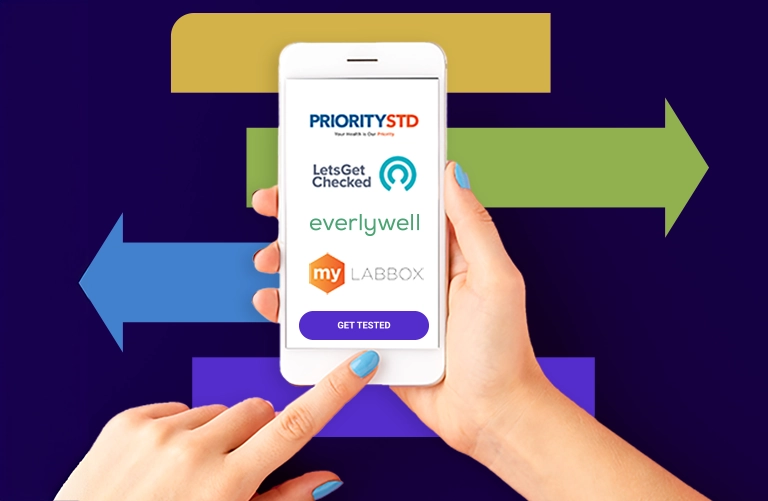Understanding Syphilis: Symptoms, Testing, & Treatment
Understanding Syphilis: Symptoms, Testing, & Treatment
Syphilis is a curable STD that can cause serious health problems when left untreated. The infection develops in stages, leading to different symptoms, but it’s best to be tested and treated before permanent damage is done. Learn more about this STD, what symptoms it may cause, how it can affect the body, testing procedures, and available treatment options.
Get Tested for Syphilis
ABOUT SYPHILIS
What Is Syphilis And How Does It Affect Your Body?
ABOUT SYPHILIS
What Is Syphilis And How Does It Affect Your Body?
Syphilis is an STD caused by bacteria that is transmitted between people through direct contact with a syphilis sore during vaginal, anal, or oral sex. The infection can also spread from a pregnant person to an unborn baby.
Syphilis infection develops in four stages: primary, secondary, latent, and tertiary. Each of these stages has it’s own signs and symptoms.
Primary stage signs and symptoms:
- The presence of sores (single or multiple) in the location where syphilis entered the body, usually in, on, or around the penis, vagina, anus, rectum, and lips or mouth
- Sores are typically firm, round, and painless, lasting 3 to 6 weeks
Secondary stage signs and symptoms:
- Skin rashes on one or more areas of the body, including palms of the hands or bottoms of the feet, appearing rough, red, or reddish-brown
- Possible presence of sores in the mouth, vagina, or anus
- Fever
- Swollen lymph glands
- Sore throat
- Patchy hair loss
- Headaches
- Weight loss
- Muscle aches
- Fatigue
Latent stage signs and symptoms:
- No visible signs or symptoms at this point
Tertiary stage signs and symptoms:
- Problems with different organ systems occurring roughly 10 – 30 years after infection
- Damage to internal organs resulting in death
Untreated syphilis can also develop into other conditions, such as neurosyphilis (affecting the brain and nervous system), ocular syphilis (affecting the eyes), and otosyphilis (affecting the ears). These conditions can result in severe headaches, trouble with muscle movements, changes to your mental state, blindness, hearing loss, dizziness, vertigo, and more.
Babies born with syphilis may have no symptoms right away, but if the infection is not treated, serious complications can develop within a few weeks, including cataracts, deafness, seizures, or death.
Source: Syphilis – CDC Basic Fact Sheet
SYPHILIS TESTING INFORMATION
What To Know About Syphilis Testing
Testing for syphilis typically involves a simple blood test. This sample will then be analyzed for the presence of the bacteria. In some cases, if it is suspected your brain, spinal cord, or nerves are being affected, you may have to have your cerebrospinal fluid tested (CSF) which is done with a lumbar puncture or spinal tap.
Source: MedlinePlus, Syphilis Tests
Results from a syphilis blood test are typically returned within about 2 – 3 days from when the lab receives your sample. A CSF test may vary, so be sure to discuss with your physician if you are required to take this test.
Source: Mayo Clinic, Syphilis, Diagnosis and Mayo Clinic, Lumbar Puncture, Results
Syphilis is treatable and can be cured easily with a single injection of Benzathine penicillin G. This medication can be used in the early stages of infection, from primary through early latent syphilis. For late latent or syphilis infection of unknown duration, it may be treated using three doses of the same injection. Once syphilis is cured, it will prevent further damage, but if there is any damage to the body already done, it cannot be repaired. For those allergic to penicillin, there are other treatment options available. If you have neurosyphilis, ocular syphilis, or otosyphilis, medication is available to help prevent disease progression, but will most likely not repair damage already done.
Those treated for syphilis should not have any sexual contact with new partners until the sores are completely healed. Any sex partner(s) should also be notified of the infection to prevent further spread and ensure they receive testing and treatment as needed.
The only true way to prevent syphilis is to abstain from sexual activity. Otherwise, it’s recommended to participate in a mutually monogamous sexual relationship in which both partners are free from infection. If you do have sex with others, be sure to always use a latex condom and avoid any recreational drugs or alcohol that may inhibit your judgment and result in unsafe sexual decisions.
Source: CDC – Syphilis Treatment and Care and Mayo Clinic – Syphilis Overview, Symptoms & Causes
- Anyone who is pregnant
- Any individual who has been intimate with a partner who has syphilis
- All sexually active gay, bisexual, or other men who have sex with men
- Those who have HIV and are sexually active
- Those who are taking PrEP for HIV prevention